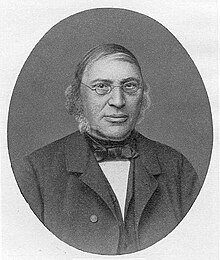Karl Lehrs
Karl Ludwig Lehrs (also: Carl Lehrs ; born January 14, 1802 in Königsberg (Prussia) ; † June 9, 1878 ibid) was a German classical philologist .
Life
Karl Lehrs was the son of the Jewish manufactured goods dealer Pinkus Kaufmann Levi (since 1812: Lehrs), but converted to Christianity in 1822. He received his doctorate in 1823 and qualified as a professor in 1831. After having worked in school for several years under poor working conditions, he held a full professorship for Greek philology in Königsberg from 1845 until his death.
Karl Lehrs was a man of decisive views. He emphasized that Homer should be seen as an original genius and not as a chamberlain. Therefore he turned against the analytical Homer research in the successor of Friedrich August Wolf and in particular against the "single song theory" of Karl Lachmann ; instead, he wanted to maintain Homer's uniform authorship for the entire Iliad . Lehrs could not gain anything from comparative mythology and symbolic interpretation of myths, but saw the Greek gods formed from the perception of nature or from the experience of an ethical idea.
For his 50th anniversary as a doctor in 1873, Lehrs had humorous “Ten Commandments” printed for classical philologists, the most important of which are (1st – 3rd commandment): One should not pray for or steal the thoughts of other authors, and neither should one blindly trust handwritten tradition. Lehrs, who was scientifically productive to the end, died in 1878 after a short illness of a bladder ailment. His students included u. a. Arthur Ludwich and August Lentz . Lehrs was friends with the landowner and art collector Fritz von Farenheid , with whom he maintained a lively correspondence until his (Lehrs) death.
He was buried in the scholarly cemetery (Königsberg) .
Fonts
- De Aristarchi Studiis Homericis (1833), who put Homer's exegesis and textual criticism on a new basis (according to Aristarchi's method of explaining the text from within);
- Quaestiones Epicae (1837);
- De Asclepiade Myrleano (1845);
- Herodiani Scripta tria emendatiora (1848), in which he makes the grammarian Herodian, who has only survived fragmentarily, tangible as a personality;
- Popular articles from antiquity (1856; 2nd, greatly expanded edition 1875), his best-known work, in which he tries to arouse enthusiasm for the beauty of the ancient world;
- Horatius Flaccus (1869), in which he works many odes of Horace rejected for aesthetic reasons as spurious;
- The Pindarscholia (1873);
- Small writings (posthumously 1902, reprinted 1979).
literature
- Ludwig Friedländer : Lehrs, Karl . In: Allgemeine Deutsche Biographie (ADB). Volume 18, Duncker & Humblot, Leipzig 1883, pp. 152-166. (with correction from vol. 18, p. 796)
- Jula Kerschensteiner : Lehrs, Karl. In: New German Biography (NDB). Volume 14, Duncker & Humblot, Berlin 1985, ISBN 3-428-00195-8 , p. 113 f. ( Digitized version ).
- Manfred Lossau : Karl Lehrs (1802–1878) . In: Dietrich Rauschning, Donata von Nerée (ed.): The Albertus University of Königsberg and its professors . Berlin 1995 (= yearbook of the Albertus University in Königsberg / Pr. Volume 29, 1994), pp. 395-302
- Manfred Lossau: From Christian August Lobeck to Ludwig Friedländer. The great century of Königsberg philology . In: Archives for cultural history . Volume 78 (1996), pp. 206-224
- Lehrs, Karl. In: Lexicon of German-Jewish Authors . Volume 8: Frie – Gers. Edited by the Bibliographia Judaica archive. Saur, Munich 2000, ISBN 3-598-22688-8 , pp. 118-122.
- Lehrs, Karl . In: Encyclopædia Britannica . 11th edition. tape 16 : L - Lord Advocate . London 1911, p. 384 (English, full text [ Wikisource ] - with wrong date of birth: June 2nd instead of January 14th).
Web links
- Literature by and about Karl Lehrs in the catalog of the German National Library
- Picture by Karl Lehrs (bottom left) from Alfred Gudemann: Imagines Philologorum , 1911
Individual evidence
- ^ Fritz von Farenheid (ed.): Letters from Carl Lehrs to a friend . Hartungsche Verlagbuchhandlung, Königsberg 1878.
| personal data | |
|---|---|
| SURNAME | Lehrs, Karl |
| ALTERNATIVE NAMES | Lehrs, Karl Ludwig |
| BRIEF DESCRIPTION | German classical philologist |
| DATE OF BIRTH | January 14, 1802 |
| PLACE OF BIRTH | Königsberg (Prussia) |
| DATE OF DEATH | June 9, 1878 |
| Place of death | Königsberg (Prussia) |

